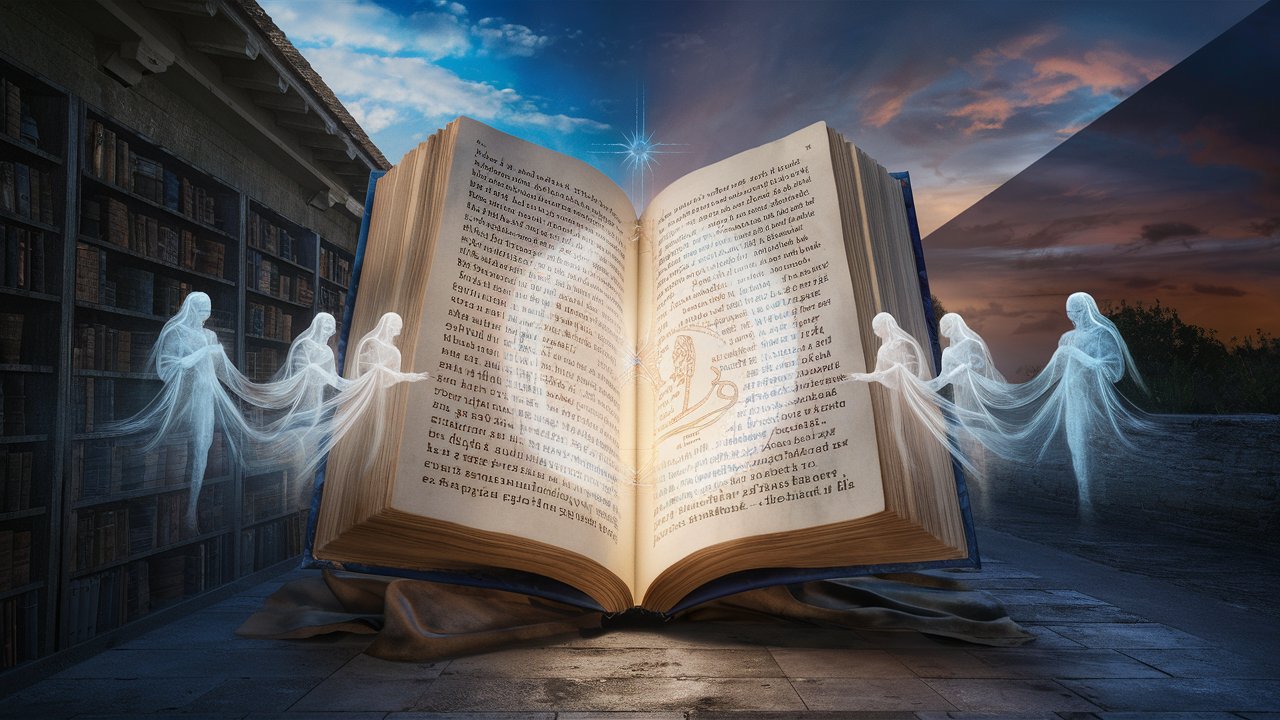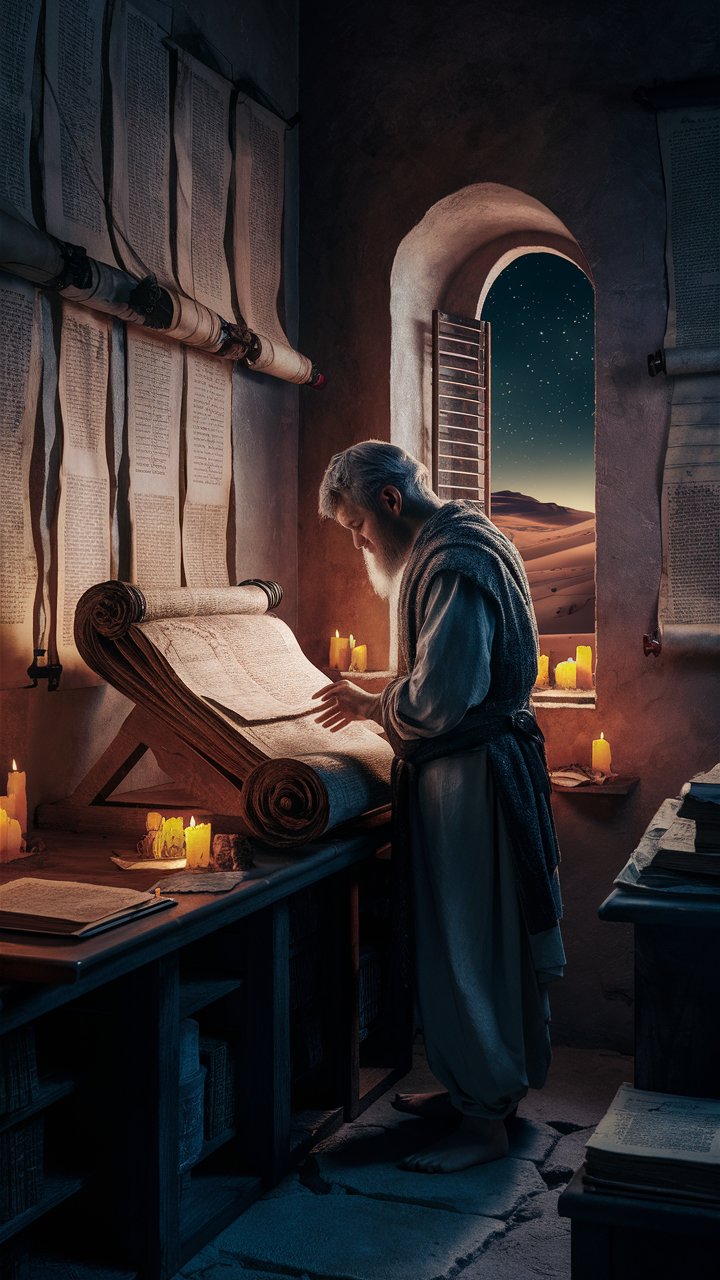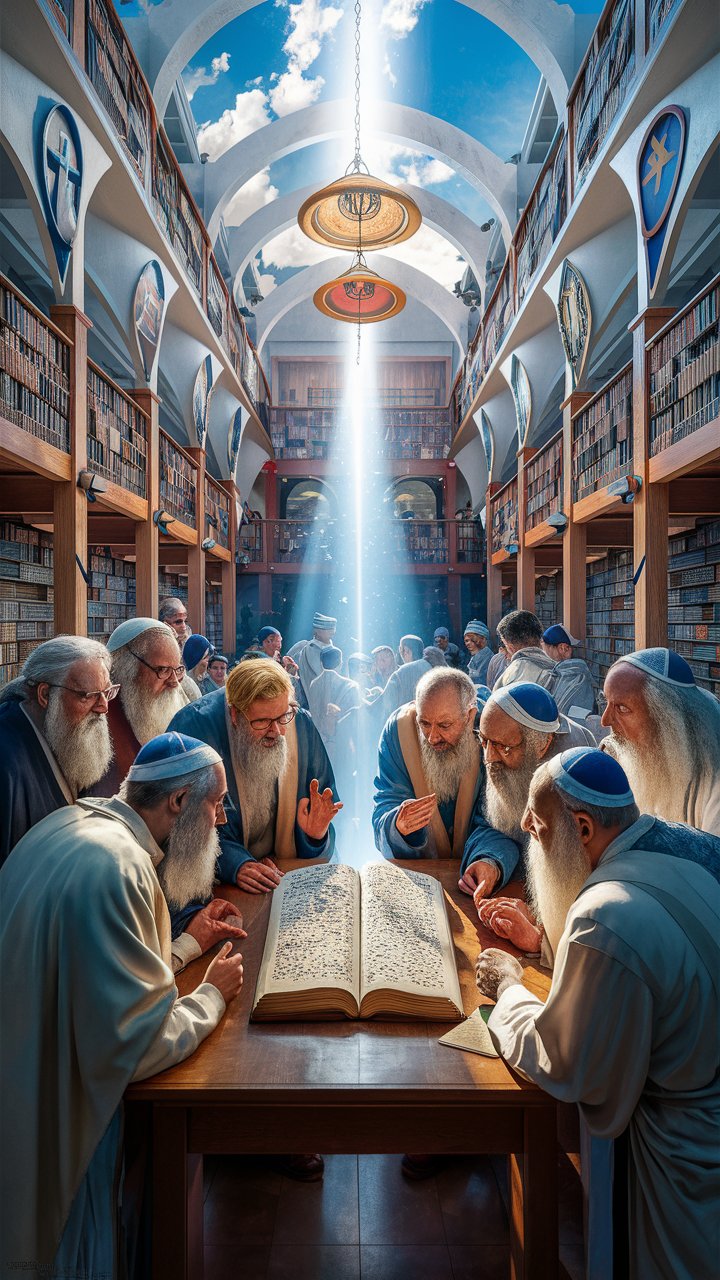Introduction
The Book of Enoch, a profound apocalyptic scripture, offers a deep dive into ancient religious narratives, significantly shaping Jewish and Christian theology. Attributed to Enoch, the great-grandfather of Noah, this work is revered for its vivid portrayal of the Watchers, celestial beings whose interactions with human women led to the birth of giants. These narratives, enriched with Hebrew scriptural elements, explore themes of divine judgment and moral decay, resonating through the texts of Jude and influencing authorship views across various religious traditions.
In addition to detailing the descent of these heavenly beings, the Book of the Watchers elaborates on their profound impact on humanity and the resultant cosmic disturbances. This scripture, while not part of the canonical Bible, commands a significant place in Orthodox Tewahedo Church teachings, providing insights into angelic influences and their ethical implications in early Christian and Jewish thought.
Key Takeaways
- The Book of Enoch, rich in apocalyptic visions, profoundly influences Jewish and Christian theology, despite not being canonical.
- It explores the dramatic descent of the Watchers, celestial beings whose earthly interactions sparked the birth of giants, symbolizing the clash between divine order and earthly chaos.
- The text’s intricate depiction of fallen angels offers insights into theological concepts of free will, divine punishment, and redemption.
- Enoch serves as a crucial link between heavenly commands and human actions, addressing corruption and the potential for spiritual redemption.
- It underscores the significant role of angelic influence on human destiny, both as corruptive and potentially enlightening forces.
- The scripture holds a revered position within the Ethiopian Orthodox Tewahedo Church, shaping doctrines about angelology and the cosmology of sin and redemption.
Exploring the Origins of the Book of Enoch and Its Impact on Religious Texts
The Book of Enoch, often attributed to the great-grandfather of Noah, is a fascinating apocalyptic text not found in the canonical scriptures of most major religions. Despite this, its influence on early Christian and Jewish thoughts is undeniable. Originating from the 3rd century, this work dives into complex themes such as the final judgment and the nature of celestial beings. It’s especially noted for its detailed account of the Watchers, angelic beings who fell from grace, providing a backdrop that enriches the understanding of sin and redemption in early scriptures.
The Historical Context of the Book of Enoch
The Book of Enoch is believed to have been written during the 3rd century BCE, a time of significant religious and cultural flux. This period was marked by intense exploration of angelology and eschatology, primarily influenced by the Jewish diaspora’s exposure to different cultures and philosophies. The Book of Enoch reflects this diversity in its themes and narratives, significantly impacting the development of religious thought regarding angels and the apocalypse in early Judaism and Christianity.
The Book of Enoch’s Contributions to Biblical Apocrypha
The Book of Enoch remains a cornerstone in the study of biblical apocrypha, offering unique perspectives not found in the canonical texts. Its detailed descriptions of heavenly realms, spiritual beings, and the preordained final judgment contributed to a richer, more complex understanding of divine justice and morality. These elements have intrigued scholars and believers alike, fostering a deeper appreciation of the spiritual and mystical dimensions within ancient scriptures.
Fallen Angels in the Book of Enoch: Understanding Their Role and Significance
In the Book of Enoch, fallen angels are depicted as Watchers who descended to Earth and corrupted human society by teaching forbidden knowledge and fathering giants, the Nephilim. This narrative has profound implications on the concepts of sin and divine retribution within the text. The portrayal of these angels highlights the eternal conflict between celestial order and earthly chaos, influencing subsequent religious doctrines. Their story resonates through various passages, emphasizing the interplay between divine justice and human frailty.
Key Aspects of the Watchers’ Role in the Book of Enoch
- Descent to Earth: The Watchers descended from heaven to teach humans and ultimately father the Nephilim, blending divine and mortal realms and disrupting the established celestial order.
- Transmission of Forbidden Knowledge: They imparted secret knowledge to humanity, including arts and crafts that led to societal advancements but also corruption and increased violence.
- Moral and Spiritual Consequences: Their actions led to significant ethical dilemmas and spiritual conflicts, highlighting themes of sin, judgment, and the consequences of divine disobedience.
- Impact on Religious Doctrine: The narrative of the Watchers influenced early Jewish and Christian eschatological views, adding depth to the discourse on free will, divine retribution, and redemption.
- Symbolism of Rebellion and Redemption: Through their story, the Book of Enoch explores the duality of rebellion against divine command and the quest for redemption, providing a complex portrayal of angelic entities.
Insights into the Descent of the Watchers
The narrative of the Watchers, who left their heavenly abode to live among humans, is a pivotal element in the Book of Enoch. This act of descent is portrayed as both a rebellion and a tragedy, intertwining themes of lust, power, and the inevitable fall. The consequences of their actions, including the corruption of human society and the genesis of the Nephilim, underscore the profound moral and spiritual dilemmas faced by these angelic beings.
Theological Implications of the Fallen Angels
The saga of the fallen angels introduces significant theological questions about free will, divine punishment, and redemption. By presenting these angels as complex characters capable of love, transgression, and remorse, the Book of Enoch invites reflection on the nature of sin and forgiveness. This nuanced portrayal helps explain why the text resonated so deeply with early religious communities, influencing contemporary interpretations of angelic roles in human history.
Analyzing the Themes and Messages in the Book of Enoch
The Book of Enoch encompasses a rich tapestry of themes ranging from divine judgment to the ethics of angelic intervention in human affairs. This text serves as a crucial bridge between divine commandments and earthly actions, captured vividly in the Book of Parables and the Epistle of Enoch. Through its narrative, it explores the consequences of angelic and human interactions, highlighting themes of corruption, redemption, and the ultimate reconciliation of celestial beings with the divine order, providing deep insights into the early Christian and Jewish eschatological views.
Apocalyptic Visions and Prophetic Warnings
The apocalyptic visions presented in the Book of Enoch are vivid and compelling, filled with prophetic warnings about the consequences of moral decay and divine retribution. These visions serve as cautionary tales that emphasize the importance of spiritual vigilance and ethical integrity. Through these narratives, the text communicates deep anxieties about the spiritual health of the community and the looming final judgment.
Angelic Interactions and Human Destiny
Central to the Book of Enoch is the theme of angelic influence on human destiny. This interaction is portrayed not just as a source of corruption but also as a potential for guidance and enlightenment. The dual role of angels reflects the text’s complex approach to the divine-human relationship, exploring how heavenly beings influence and are in turn affected by earthly matters.
“Every visible thing in this world is put under the charge of an angel.” – Saint Augustine
The Influence of the Book of Enoch on Early Christian and Jewish Beliefs
Despite its exclusion from the canonical scriptures of the mainstream Judeo-Christian traditions, the Book of Enoch holds significant sway in Ethiopian Orthodox Tewahedo Church teachings. It shapes foundational aspects of angelology and the cosmology of sin and redemption. The vivid descriptions of the Watchers and their subsequent judgment offer a nuanced understanding of the balance between divine foreknowledge and free will, impacting early theological debates and helping shape the development of religious thought concerning the metaphysical realms.
Impact on Early Christian Theology
The Book of Enoch had a profound influence on early Christian theology, particularly in the concepts of angelology, demonology, and the end times. Its themes are echoed in New Testament writings and patristic literature, showing the text’s deep theological reach and its role in shaping early Christian narratives about the spiritual warfare and the role of angels in human affairs.
The Book of Enoch in Jewish Tradition
In Jewish tradition, while not canonical, the Book of Enoch has been influential in shaping ideas about the celestial hierarchy and divine justice. It is particularly revered in the Ethiopian Orthodox Tewahedo Church, where it is considered scripture. This acceptance highlights the cultural and theological diversity within Judaism and its different branches, reflecting varying interpretations and emphases on apocalyptic literature.
[lasso rel=”amazon-27″ id=”1987″]
Conclusion
In synthesizing the teachings of the Book of Enoch, it is evident that this text, traditionally attributed to Enoch and integral to the Ethiopian Orthodox Tewahedo Church, offers more than ancient scripture. It illuminates the profound interactions between heavenly beings and human women, pivotal in shaping the narratives of sin and redemption within Jewish and Christian thought. As it delves into the descent of the Watchers and their impact on earth, it highlights the balance of divine order amidst earthly chaos, echoed through the Book of Jubilees and the Dead Sea Scrolls.
The text’s portrayal of fallen angels, the Nephilim, and their ethical and theological implications resonate with themes found in the Old Testament Pseudepigrapha. The Book of Enoch serves not only as a religious document but also as a cultural artifact, reflecting the Early Christian and Jewish apocalyptic literature. Its influence extends beyond the canonical scriptures, encouraging a deeper exploration of the metaphysical questions surrounding divine justice and moral integrity, crucial for understanding the historical and spiritual context of early religious communities.












